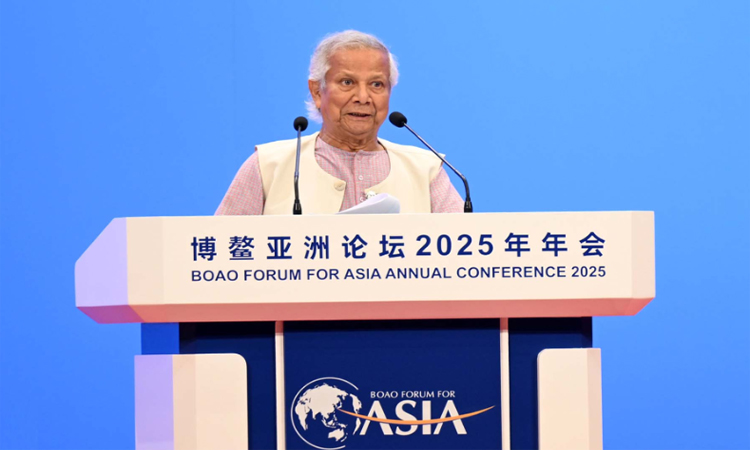News Flash
News Flash

HAINAN (China), Mar 27, 2025 (BSS)- Chief Adviser Professor Muhammad Yunus has said the his interim government has initiated critical reforms to restore public trust in Bangladesh.
'Our youth and citizens demonstrated exceptional resolve and strength to redefine the future of Bangladesh. To restore public trust we have initiated critical reforms," he said while addressing the opening plenary of Boao Forum for Asia (BFA) conference here today.
Prof Yunus said independent commissions have been launched to reform the electoral system, judiciary, civil administration, and law enforcement.
"These reforms, when implemented, will bring about fundamental transformation of our nation," he added.
The Chief Adviser said: "As we build a new Bangladesh, we face multiple challenges which are shared by other Asian countries."
In particular global financial market instability, political uncertainties, diplomatic tensions, and trade disruptions create volatility, he said.
He said rising interest rates and debt servicing costs are deepening Asia's debt crisis.
Prof Yunus said despite global commitments to the 2030 Agenda, progress is slow. Only 24 percent of SDG have been met.
He mentioned that developing Asian countries face an SDG financing gap of 2.5 to 4 trillion US dollars annually.
Beyond SDG financing, Asia also needs large scale investments in infrastructure and economic diversification through responsible financing, he said.
The Chief Adviser said Bangladesh has been a victim of corruption and illicit financial flows, while these corrupt practices cost developing countries an estimated 1 trillion US dollar annually which is multiple times more than the total ODA they receive.
He said Asia should stand united to establish a multilateral mediation mechanism for asset recovery and return.
"Food security is under increasing pressure. Rising prices of essential commodities are straining household budgets, especially for low-income families," Prof Yunus said.
Climate change and natural disasters are exacerbating this crisis, he said, adding that strengthening food supply chains is essential.
He said energy security is critical, especially for net-importing developing countries, while energy supply disruptions drive inflation, economic instability, and debt distress.
"We must find sustainable energy solutions and scale up investments in renewables," he added.
The Chief Adviser stressed investing in health and education for human capital development. Countries that invest in universal healthcare see better economic productivity, he noted.
Digital education and vocational training must be expanded to equip our youth for the jobs in future, he asserted.
About global crisis, Prof Yunus said geopolitical tensions are rising; climate change is escalating; debt burdens are unsustainable; and humanitarian crises are growing.
Political will for development cooperation is weakening, while the world faces an alarming shortfall in collective action, he said.
The Chief Adviser observed that Asia, home to 60 percent of the global population and 55 percent of global GDP, was at the center of these changes.
He said emerging norms, regulations, and technologies are reshaping governance and economic policies.
"Assumptions that shaped policies a decade ago are no longer relevant. The need for regional and global cooperation has never been more pressing," Prof Yunus added.
Former UN Secretary-General and Chairman of the Boao Forum for Asia Ban Ki-moon, Executive Vice Premiere of the State Council of the People's Republic of China Ding Xuexiang and Secretary General of Boao Forum for Asia Zhang Jun also spoke on the occasion.